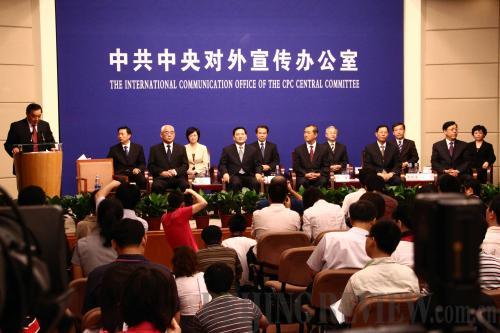|
 |
|
ANY QUESTIONS? The CPC spokespeople meet the press for the first time (GAO XUEYU) |
For many years, the Communist Party of China (CPC) has been blamed for being a secretive organization operating behind a veil. Now, in a bid to shed this image, the world's largest political party is taking measures to become more transparent and approachable in what is seen as an unprecedented move.
On June 30, the day before the 89th birthday of the CPC, a total of 11 spokespeople from various departments of the CPC Central Committee lined up before the press. The Party aims to make its affairs more understandable to both the media and the public at large.
"Introducing a spokesperson system to the CPC departments will create a much greater transparency to the Party and the people can understand how the policies are made," said Gao Zhikai, current affairs commentator with China Central TV.
The CPC Central Committee has 26 departments and now 11 of them have their spokespersons. "More spokespeople will be seen in other departments in the future," said Wang Chen, Director of the International Communication Office of the CPC Central Committee, at a press conference on June 30.
The CPC, by all accounts, is the world largest political party with membership exceeding 78 million, accounting for 6 percent of the country's population. More importantly, the Party is ruling the world's most populous country and one of the fastest-growing economies. The CPC has been in power for 61 years since the founding of the People's Republic of China in 1949.
"The establishment of the spokesperson system in the Party departments is an important step to make the Party affairs open and transparent, aiming to shed light on its operations," Luo Zhongmin, Professor of the Party School of the CPC Beijing Municipal Committee, told Procuratorial Daily. As the sole ruling party in China, the CPC leads the country through formulating policies, proposing legislations and recommending important leaders. "The CPC exercises great power and shoulders a heavy mission and it is of vital importance to ensure that operation of that power is done in the light," said Luo. "Undoubtedly, the establishment of spokesperson system is an important way of doing this."
Media friendly
Unlike the ruling party, the Chinese Government has long established a spokesperson system in its various departments and has achieved progress in the past years in making the government more understandable to the public.
The Ministry of Foreign Affairs (MOFA) was the first government department to formally establish a spokesperson system, dating back to 1983. But before that, then Director General of the Information Department of MOFA Qian Qichen debuted as China's first spokesman and released China's foreign policy to the press on March 26, 1982.
The spokesperson system in the government agencies was further promoted in 2003 when SARS (severe acute respiratory syndrome) broke out in China. Owing to the blocked information channels, China's reputation and image were negatively influenced. "This event also let the government recognize the importance of having good communication with the public and telling the people what is going on," said Shi Anbin, Associate Professor of School of Journalism and Communication of Tsinghua University.
After that, government agencies began to learn how to deal with the media and have formulated regulations to promote spokespersons. Besides regular news releases, when emergencies happen, these spokespeople are always the first to face the cameras. When the riots in the Xinjiang Uygur Autonomous Region occurred, domestic and foreign journalists were also invited to the region to see the situation first hand.
Observers say that after nearly 30 years of development, the spokesperson system in government agencies is becoming mature and the ruling party should also follow suit.
"There are differences as well as close links between the spokesperson systems in the government agencies and the Party departments," said Pan Hongqi, a political affair commentator, in his article for Yangcheng Evening News. According to him, as China's ruling party, the CPC should release more information on the process of proposal and formulation of important policies and guidelines; the government spokespersons should talk more about the implementation processes and results of these policies and guidelines.
Party School opens
To further indicate the CPC's determination of opening up its system to the world, the Party School of the CPC Central Committee opened its door to more than 60 correspondents from domestic and overseas media on June 30. Foreign media include the Associated Press, the Agence France-Presse, The Guardian, CNN and the Australian Broadcasting Corp.
It was the first time that the country's highest institution for training of high- and middle-level Party officials invited a large group of media to tour the mystery-shrouded campus in northwest Beijing.
"The Central Party School and the whole Party system haven't interacted much with the outside world - this is something we are trying to change," said the school's Vice President Li Baosheng. |